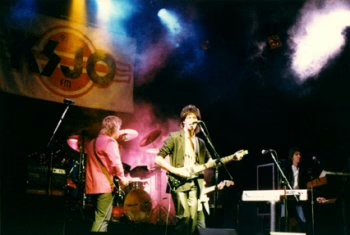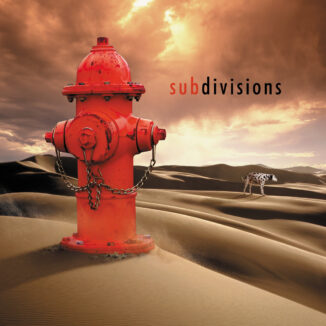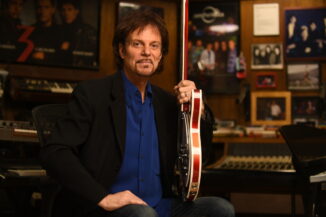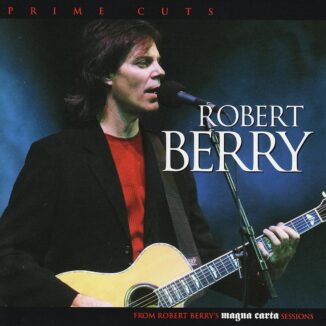
Robert Berry is well known in the Bay Area (United States) perhaps for his most famous accomplishment for his role in “3,” a band formed with ELP’s Keith Emerson and Carl Palmer in the late 80s. That aside, Robert Berry is also an award-winning Producer along with composing, arranging, and performing with Progressive music artists. Earlier this year Robert released his Prime Cuts disc on the Magna Carta label. Metal Express Radio was fortunate enough to catch Robert’s attention between studio sessions to get him to answer a few questions.
Magna Carta just released one of their Prime Cuts series in your name. This must feel like quite an honor. Did you have any input into track selection and arrangement?
It is an honor to be included in the Prime Cuts series. I not only had a hand in picking the tracks for Prime Cuts, but all the songs were recorded for two reasons. The first being that my first professional band, Hush, started as a Progressive Rock cover band. We played Roundabout, Minstrel, Watchers of the Skies, etc. The second reason being that I wound up playing with a lot of these guys … GTR with Steve Howe, “3” with Keith Emerson and Carl Palmer, all of the guys from Ambrosia. I produced a tribute to Rush featuring many great performers and also a tribute to Jethro Tull that featured the original rhythm section. Ian Anderson got a kick out of that one. The only song I didn’t pick was “Brain Damage.” It was on the first tribute album I did for Magna Carta. They wanted it to be an exact copy of the original and that isn’t what I usually do. But, it fit in here so they put it on. All the arrangements were done combining my knowledge of the original from playing it in Hush, together with my own style of adding more power and pulse to them. Then I mixed in the insight I gained playing with the original members. That made a mix of how I think the song would have sounded if it were just being released today and I was a member of that band. Not just my own ideas, but also a fusion. Have I confused you now? LOL
One of your most famous accomplishments was forming the band “3” with Keith Emerson and Carl Palmer. How was this experience? Was it educational in regards to furthering your career?
Playing with Keith and Carl was a once in a lifetime experience. Not only are they at the very top of the music world, but also are incredibly fun and motivating to be around. Carl Palmer is one of the most articulate and positive guys I have ever met. I just saw his new solo band last week and he hasn’t changed a bit … powerful and professional — and still the best drum solo in the business. I saw Keith’s solo band about 6 months ago, and they were great. And, now I hear they’ve added Marc Bonilla, a guitar player from my home area. And he is one of the best. If you get a chance check them out.
To say it helped my career is an understatement. It became the foundation for everything that came after. Playing with Sammy Hagar, getting my band Alliance a record deal, playing with Ambrosia. “3” put the stamp of approval on me. Musicians knew if I could cut it with those monster players I must be able to hold my own.
Quite a few of the tracks on Robert Berry: Prime Cuts are tribute tracks (e.g., ELP, Jethro Tull, Rush). Are you a fan of these artists’ works? How does a musician/producer approach recording a version of a “classic” like these?
The bottom line to recording a new version is you have to have loved and absorbed the original version to keep the essence of what the song really stands for before you go changing it.
Some of your greatest achievements are “behind the scenes” as a Producer along with composing, arranging, and performing with musical artists. What’s a “typical” day like for Robert Berry?
I work at my studio, Soundtek, 5 days a week. I start at 10 am and go until 8 pm. I focus my complete energy and musicianship into this time frame. Mostly, what I do is produce singer-songwriters that either don’t have bands or are just tired of the push and pull of a band on their material. So they come to me. I play quite a few instruments, so they do their part, say piano and vocals, and I do the rest. I start by working out the song arrangement. Check lyrics, define a target audience they want to compete for, and start recording a track that fits. I have two ProTools HDaccel systems and a load of new and old instruments, so I can pretty much do whatever needs to be done, from the old Hammond B3 to the latest Korg Oasis keyboard. 3 drum sets, 100 guitars that you can view on my website, and samples and percussion toys for days. It is hard, focused work, but everyday is a fun day in my studio.
At what point in your career did you feel that being a little more hands on during Production is what you wanted to do?
When I was 12, I did my first record at a studio in San Jose, California. That’s when I got the bug. By the end of High School, I was working in that studio as an engineer. Bands would come in and either need an overdubbed string part (I had a Melotron) or just needed something fixed. So, I started playing all these instruments on sessions. Then my boss told somebody that why don’t they just sing and I would put together the entire track. That’s when it really started. That is what I was born to do. It’s like a guy that puts together puzzles or loves video games. My puzzle is music production. I also talk a little bit more in depth on my website in a section called “The Early Years”.
Which do you enjoy most … being a Producer or being a musician? Do you find being one more difficult than being the other?
Different than most producers, three quarters of what I produce I am playing all the instruments on. Check out Prime Cuts and you’ll be able to see what tracks others played on. But, you should not be able to tell by just listening. It is definitely more difficult to produce a band where I’m not playing anything. If I’m playing, I can work it until I get it the way I want it. But when I’m trying to inspire others to do their best work, there is psychology, musicianship, respect, and level of expertise that all have to come together. I have found, though, that because I play these different instruments, it is easy for me to interact with each individual musician on their own level. Like I said, everyday is a good day at Soundtek.
As a Producer/Composer/Arranger you’ve worked with many a band. Were there any special moments in this regard that you can share?
I can remember a few surprises. I had a song “Lover to Lover” for the “3” album. I gave it to Keith and he really liked it. He went home that night and spent many hours putting his own touch to it. When he played it for me the next day, I couldn’t believe how he put his style and influence so seamlessly into that song. Carl also always impressed me with the amount of ideas he had. I can still remember sitting in my flat in London with him writing the words to “Des De La Vida.” Carl speaks Spanish, and lyrically between the two of us that became a special piece of music. You’d think that I would be talking up and down about his drumming. The drumming is a given. He is incredible. But, the energy or ideas and possibilities are where Carl really shines.
Another great moment for me is when I got a cassette tape from Steve Howe with his writing ideas on it. He has this song called “You Only Have Yourself To Blame” on it. I took that song back to my place and spent all night reworking it. Chords, structure, meaning. You see, I knew Steve as this really honest, gentle, fantastic guitar player. So, I put more Steve Howe sections in it for smokin’ guitar and changed the meaning to something more humble from “you to blame” into “no one else to blame.” About taking it on yourself. I thought that was a more Steve Howe sentiment. When I brought it back the next day and played it for him, he gave me one of the biggest compliments of my career. He told me that no one had ever worked with him on a song to his satisfaction besides Jon Anderson. And, he loved “No One Else To Blame.” By the way, he also loved the new bass line to “Roundabout.” And, because of it, he helped me with the ending by giving it the Howe touch. A great moment for me.
I have so many special times I remember. Just last year on my last tour with Ambrosia, I had fans of my music come up to me from all over the USA and mention the songs that were going to be on this album.
If you could work with any musician, band, producer, etc. from the past or present, who would it be and why?
That’s a hard one because my two favorites that I haven’t worked with are Paul McCartney and Jeff Beck. I was inspired by McCartney and Chris Squire as a bass player. I spent a little time with Chris Squire, as we had the same manager in England. I even had him sign my Rickenbacker. And, as a guitar player, I still can’t believe how Beck gets around on that thing. Magna Carta President Peter Morticelli has a connection to Jeff Beck through Terry Bozzio, so who knows, maybe some day. I also am quite taken by a few of the newer artists like Sheryl Crow. That would be interesting. Maybe a little too Country for me, but I like her ideas.
With technology more rampant than ever, nowadays a lot of musical projects come together as MP3 tracks mailed from one musician to another. Sometimes the parties never actually meet. How do you feel about this? Do you think spontaneity gets lost?
You know I’ve been doing this for years with bigger formats like ADAT tapes. If you get a guy like Trent Gardner from Magellan, let’s say, you give him the best work you can do and you tell him, “kick some ass on this.” Well, he has this wealth of knowledge and musical information that you haven’t experienced from your corner of the world. So, if you can inspire him by your performances, then you are going to get the best out of him. I did this with Steve Walsh on my December Peoples CD. I did all the music on that one, and tried to do a take on Holiday music as if it was done by the original Progressive-type band I was interpreting. When Steve heard the track, he called me and said he loved it. Well, I’ve heard that before. But, when I got his vocal work back to Soundtek, it was so inspired and heartfelt that it really made that track. You just have to inspire people to do their best work, and be working with the best people.
What’s next for Robert Berry? Any new projects you can talk about? Any full-length solo Robert Berry albums in the works?
I have two things in the works. I have a new Alliance album that is halfway done. Hopefully my schedule opens up a bit so I can finish it soon. And, I have an acoustic history album of my most notable material that I have been trying to put together. And, of course, five days a week I’m working with somebody that you might be hearing soon. Magellan has a new one coming out that I did at Soundtek. Jack Foster’s Jazz Raptor has a new one halfway done. Magna Carta is talking to me about a big new project. I’ll be around. And, I’ll talk to you again soon.
Thanks for taking the time to speak with us Robert!
Thanks for having me. And thanks for the help with Prime Cuts. I’m really proud of the work on that album.




Be the first to comment